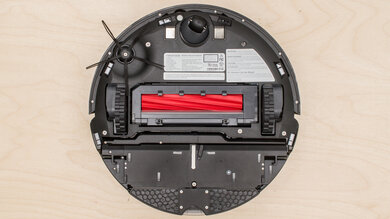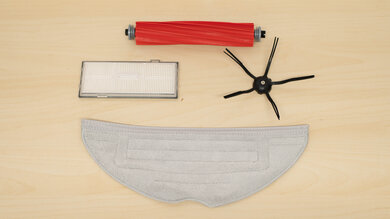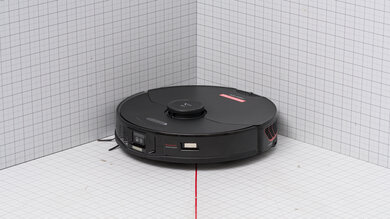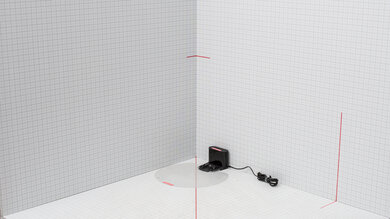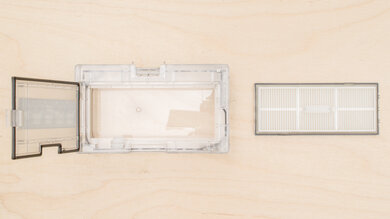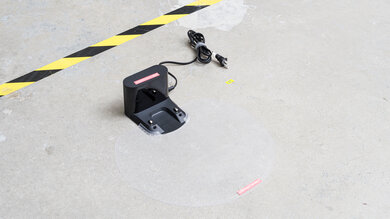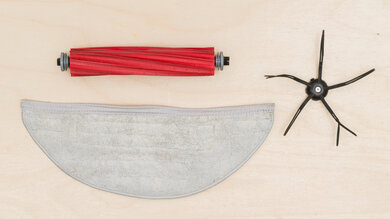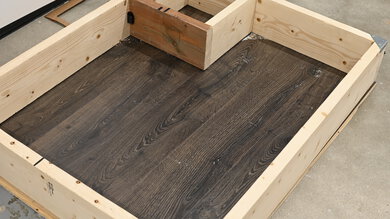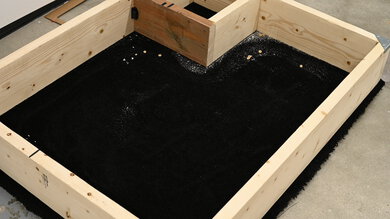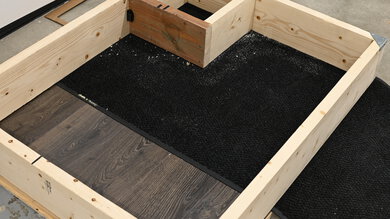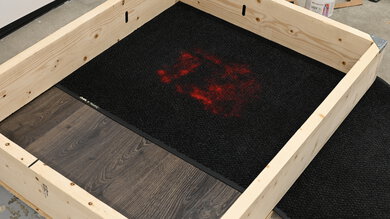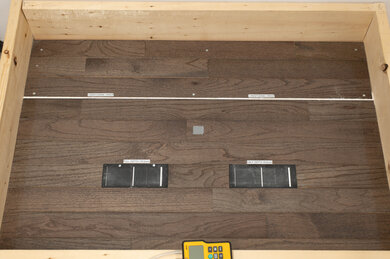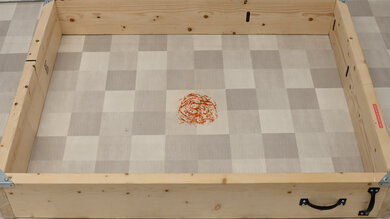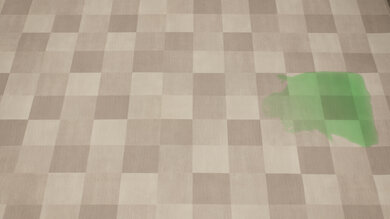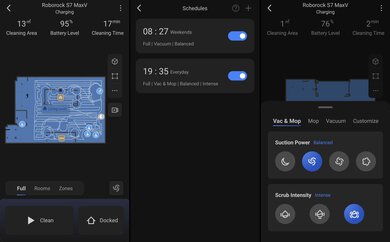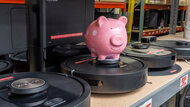The Roborock S7 MaxV is a highly advanced robot vacuum and the flagship model of Roborock's extensive robovac lineup. It's effectively an upgraded version of the standard Roborock S7, with a more powerful suction motor and a dual-spectrum mapping and navigation system that's very similar to the Roborock S6 MaxV. It combines a LIDAR sensor array to quickly map out its coverage area with a pair of cameras with 3D scanning capability to identify and react to hazards like pet waste, footwear, or rugs and carpets in real time. You can also look through the cameras to keep an eye on things at home while you're away. It features the standard S7's ultrasonic mopping capability to help scrub away dried debris on hard surfaces.
Our Verdict
The Roborock S7 MaxV is acceptable for a multi-surface household. Its performance on hard floors is great, but it doesn't do quite as well on carpet since it lacks the surface agitation to pick up fine material. This also makes picking up pet hair from carpet difficult, so it does an inadequate job of that task. Its obstacle handling is reasonable—it navigates around a room it's mapped in advance with its LIDAR sensor pretty well and generally detects and avoids objects on bare floors, but it doesn't perform object detection as well on carpet. This robot vacuum is only equipped with a basic, charging-only dock. Though the dock won't help maintain the mopping system, this vacuum does a reasonable job mopping up stains.
-
Good obstacle avoidance on bare floors.
-
Thoroughly picks up all debris on floors.
-
Good debris pickup along wall edges on hard floor surfaces.
-
Good medium and large debris pickup on carpets.
-
Struggles with pet hair and fine debris on carpet.
-
Leaves material along edges and in corners on carpeted floors.
-
Pet hair ends up being pressed into carpet or dragged around and redeposited.
-
Obstacle avoidance system works poorly on carpet.
The Roborock S7 MaxV does a poor job dealing with pet hair on most floors. While it has little trouble dealing with pet hair on bare floors, it can have a hard time on low-pile carpets and rugs. Thankfully, its ultrasonic mopping module is useful for tackling dried-on stains, like dirt that your pet might track in from outdoors. Its 'ReactiveAI 2.0' obstacle recognition system lets it identify and maneuver around hazards like pet waste. The remote viewing function lets you keep tabs on your pet while you're away from home, and you can also speak to it through the built-in speakers. It can be rather noisy at higher power levels, which isn't ideal if your pet is sensitive to loud noises. It also isn't particularly effective at sealing in fine particles like pet dander. Its side brush and brushroll are tangle-prone, but thankfully, you can easily clean them.
-
Wide array of cleaning configuration options.
-
Poor air filtration performance.
-
Noisy at higher suction levels.
-
Struggles with pet hair on carpet.
-
Quite a few parts need regular cleaning when used as a standalone vacuum.
-
Incurs high recurring costs.
The Roborock S7 MaxV is very good at hard floor pick-up. It's thorough in cleaning hard floors, systematically covering the entire area and removing all fine, medium, and large debris. It only leaves a little material in corners.
-
Thoroughly picks up all debris on floors.
-
Good debris pickup along wall edges on hard floor surfaces.
The Roborock S7 MaxV does a reasonable job picking up material from low-pile and high-pile carpets. It does a fair job picking up medium and large debris from carpets, though it leaves some material at wall edges and in corners. It doesn't work as well removing fine material from carpets since its brushroll doesn't provide enough agitation to loosen fine material so that it can be sucked up.
-
Effective surface detection system.
-
Good medium and large debris pickup on carpets.
-
Doesn't pick up fine material from carpets.
-
Leaves material along edges and in corners on carpeted floors.
The Roborock S7 MaxV is inadequate for picking up pet hair. Its single rubber-vaned brushroll doesn't provide enough surface agitation to lift pet hair out of carpeted surfaces. Some pet hair that does come detached but doesn't get sucked up ends up either being pressed in or moved around and redeposited.
-
Struggles with pet hair on carpet.
-
Pet hair ends up being pressed into carpet or dragged around and redeposited.
The Roborock S7 MaxV does alright at obstacle handling. It's satisfactory at navigating and negotiating around large obstacles in a room that it's mapped with its LIDAR sensor. Its obstacle avoidance system functions well, especially on bare floors, where it identifies and avoids large and small obstacles. This system doesn't work as well on carpeted floors though, where it frequently fails to identify objects and avoid them.
-
Good obstacle avoidance on bare floors.
-
Obstacle avoidance system works poorly on carpet.
- 6.3 Multi-Surface Household
- 5.4 Pets
Performance Usages
- 8.0 Debris Pickup: Hard Floor
- 6.9 Debris Pickup: Carpet
- 5.0 Debris Pickup: Pet Hair
- 6.6 Obstacle Handling
Changelog
-
Updated Jul 17, 2025:
We added new types of obstacle avoidance technology to the Obstacle Avoidance test box.
-
Updated Apr 16, 2025:
We've added text to this review for the new tests added in Test Bench 1.0.
- Updated Apr 16, 2025: We've converted this review to Test Bench 1.0, which updates our performance testing to include new tests to evaluate Obstacle Adaptability, Obstacle Avoidance, Height Clearance, and Threshold Clearance. We've also introduced new performance usages. For more information, see our changelog.
-
Updated Mar 05, 2025:
We added the Dyson 360 Vis Nav as an example of a robot vacuum with greater suction due to its lower-mounted air inlet.
- Updated Sep 17, 2024: To provide comparable test results across other hybrid vacuum/mop units, we've re-evaluated this vacuum's performance in the Stains section of the review with a fresher sample of pasta sauce and within a larger boundary box. The score has been updated.
Check Price
Differences Between Sizes And Variants
The Roborock S7 MaxV comes in three variants, though the vacuums are identical and vary only in terms of the base station. The Roborock S7 MaxV Ultra is the flagship model, as it comes bundled with the Empty Wash Fill Dock that can automatically wash the vacuum's mop pads, refill its water tank, and suck debris from its internal dustbin. The Roborock S7 MaxV Plus comes with the more basic Auto-Empty Dock that only empties debris from its dustbin. Finally, the Roborock S7 MaxV is a simple standalone unit with no base station included. It's the variant that was tested, and you can see its label here. You can purchase this vacuum in 'Black' or 'White'.
Let us know in the comments if you come across another variant of this vacuum, and we'll update our review.
Compared To Other Robot Vacuums
The Roborock S7 MaxV is a high-end robot vacuum. In terms of automation capabilities, it's a significant step up over the standard Roborock S7; the addition of a dual-camera system allows it to identify and adjust to different types of rooms or to spot and avoid hazards like pet waste, slippers, or power cables, so you don't have to worry too much about keeping your floors spotless before letting it run. It can also be used as a roving security camera, while the onboard speakers and mic enable you to communicate with anybody in your home while you're away. It's also fully compatible with a self-emptying station that can refill its water tank and wash its mopping pads, similar to the Narwal T10.
If you're looking for alternatives, consider our list of recommendations of the best robot vacuums, the best robot vacuums for hardwood floors, and the best robot vacuums for carpet.
The Roborock S8 Pro Ultra is a slight improvement on the Roborock S7 MaxV, though the latter is still a good option. The S8 Pro Ultra's brushroll lifting system prevents its rollers from getting dirty as it mops, though the mopping system isn't quite as effective as that of the S7 MaxV. The S8's twin brushrolls also make it far more effective in dealing with pet hair, and its fast-charging system means that it can replenish its battery much faster than the older S7. Meanwhile, the S7 MaxV has a color camera instead of an infrared system, and you can use it as a roving security camera by looking through its camera in its companion app. The S7 MaxV also has a removable water tank instead of the built-in component found on the S8 Pro Ultra, making it easier to check and clear out blockages. Lastly, while we didn't test it in this configuration, it's worth noting that you can bundle the S7 MaxV with a multi-function dock that's similar to the one bundled with the S8 Pro Ultra.
The Roborock S8 is a slight upgrade over the Roborock S7 MaxV, though the vacuums are still pretty similar overall. The S8 has a slightly more potent suction motor and a new dual-roller floorhead, resulting in slightly better debris pickup on most floor types and improving its ability to clear away pet hair. The S8 is also noticeably quieter. The S7 MaxV has a color-capable camera and a built-in microphone, so you can use it as a roving security camera. Unlike the standard S8, it's also available with a docking station that empties its dustbin, washes its mop pad, and refills its water tank.
The Roborock S7 MaxV is better than the Roborock S7. The MaxV's 'ReactiveAI 2.0' system allows it to identify obstacles in real-time, determine what kind of room it's in, and suggest different suction or mop settings. It also has a stronger suction motor, improving pet hair pickup, especially on bare floors. While the standard S7 is compatible with Roborock's Auto-Empty dock, you can currently only buy the Empty Wash Fill Dock with the MaxV, which not only empties its dustbin but washes its mopping pads and refills its water tank.
The Roborock S7 MaxV is a little more capable than the Roborock Qrevo, though the Qrevo is a very solid option for the price. The S7 MaxV has a more advanced hazard detection system, which uses an RGB camera as opposed to the structured light sensor found on the Qrevo. Not only does this result in superior object recognition capability, but it also means that you can use the S7 MaxV as a roving security camera when you're away from home. The S7 MaxV also delivers better overall debris-pickup performance. That said, the Qrevo's mopping system can lift higher, so you don't have to worry as much when the vacuum is transitioning from mopping stains to cleaning carpets within the same cleaning cycle.
The Roborock S7 MaxV is better than the eufy X10 Pro Omni. The Roborock feels better built and does a considerably better job of dealing with debris on most floor types. It's also better at maneuvering itself and has an even more fleshed-out companion app.
The Dreame L10s Ultra and the Roborock S7 MaxV are both hybrid vacuum mops with relatively advanced real-time hazard avoidance systems. That said, you'll need to upgrade to the pricey Roborock S7 MaxV Ultra to get something that's bundled with a multifunction docking station. Meanwhile, the Roborock does deliver superior debris-pickup performance on most surface types, and its mopping system does a better job of scrubbing away stains.
The Roborock S7 MaxV is ultimately better than the Ecovacs DEEBOT OZMO T8 AIVI. Both are advanced robot vacuums with dual-sensor navigation systems, with LIDAR to map out their coverage area and cameras to identify and react to hazards like pet waste in real-time. However, the Roborock charges much faster, performs better on bare floors, and has an ultrasonic mopping system to scrub away stains. Its top-trim Empty Wash Fill Dock is a pricey accessory that can empty its dustbin, refill its water reservoir, and clean its mopping pads. The Ecovacs does a better job of cleaning carpeted floors.
The Roborock S7 MaxV is a more fully-featured vacuum than the Roborock S6 MaxV, though the latter is still a great option if you don't want to spend quite as much. Both vacuums feature LIDAR and optical sensors, allowing for precise room mapping and real-time object avoidance. However, the S7 MaxV performs slightly better on most surfaces. It also has a more advanced mopping system that uses vibrating pads to scrub away stains. Only the S7 MaxV can also be used to clean and mop throughout the same cleaning session since it can raise its mop pad when it detects that it's on carpet. The S6 MaxV isn't compatible with a self-emptying base station, so you'll need to empty its dustbin and refill its water tank manually. However, the S6 MaxV does have a much larger dustbin that won't need emptying as often.
The Roborock S7 MaxV is better than the iRobot Roomba j7. The Roborock has an impressively effective mopping feature and a much longer maximum battery life, and it performs considerably better on bare floors and high-pile carpets. Like the Roborock, the iRobot uses cameras that let it identify and react to hazards like pet waste in real-time. However, the Roborock also has a LIDAR sensor for quicker and more precise room mapping. While the iRobot is compatible with a self-emptying base station, the Roborock is fully compatible with the Empty Wash Fill Dock, which not only empties its dustbin but washes its mop pads and refills its internal water reservoir, though this accessory is very expensive.
The Roborock S7 MaxV is better than the Roborock Q5, which isn't surprising given that the former is the manufacturer's flagship model. The S7 MaxV has a dual-sensor navigation system, which uses LIDAR for quick mapping and a pair of 3D scanning cameras to spot and react to hazards in real-time. Its more powerful suction motor also enables it to better clean low-pile carpeting, though its rubber brushroll doesn't provide the same level of surface agitation as the Q5's bristled roller. The S7 also has a mopping feature that allows it to scrub away dried-on stains. While you can bundle both with self-emptying stations, the S7 MaxV's far pricier top trim docking station is more advanced, as it not only empties its dustbin but cleans its mopping pads and refills its water tank.
The Roborock S7 MaxV is better than the Roborock S6. The S7 MaxV has a hazard-avoidance function, a far more effective mopping feature, and delivers stronger performance across all surface types. Unlike the S6, it's also fully compatible with a self-emptying station, which reduces hands-on maintenance requirements. That said, the S6 has fewer parts that need regular cleaning and a larger internal dustbin.
The Roborock S7 MaxV is better than the eufy RoboVac X8. The Roborock has a more advanced dual-sensor navigation system, resulting in improved maneuverability and real-time hazard avoidance capability. It's also fully compatible with a self-emptying station to reduce maintenance requirements, feels better built, and delivers stronger performance across all surface types than the eufy. Unlike this variant of the eufy X8, the Roborock also has a mopping system to scrub away stains. However, the eufy is substantially quieter.
The Roborock S7 MaxV is a more versatile option than the Narwal T10. Only the Roborock can mop and vacuum within a single cleaning job. The Narwal is designed primarily as a robot mop with a far less advanced vacuuming capability. It doesn't have a brushroll, instead relying on a pair of side brushes to direct debris into a suction inlet, resulting in inferior performance on carpets. The Roborock's optional Empty Wash Fill Dock is even more advanced than the Narwal's base station. Not only does it wash and clean its mopping pads, but it also empties its internal dustbin and refills its water tank, reducing hands-on maintenance requirements. The Roborock's 'ReactiveAI 2.0' system also allows it to identify and react to common household hazards.
The Roborock S7 MaxV is better than the Roborock S5. The S7 MaxV has a more advanced navigation system with a real-time hazard-avoidance function, a far more effective mopping feature, and delivers stronger performance across all surface types.
The Roborock S7 MaxV is a much better robot vacuum than the Shark AI Robot, though that isn't overly surprising given the substantial price discrepancy between the two. The Roborock has a more advanced dual-sensor navigation system, which allows it to map out its coverage area and spot low obstacles. It also features an ultrasonic mopping system that's impressively effective in scrubbing away stains, not to mention a far more potent suction motor, resulting in better debris pickup. Lastly, the Roborock is fully compatible with the brand's Empty Wash Fill Dock, which automatically empties the vacuum's dustbin, refills its water tank, and washes its mopping pads, making for a mostly hands-off ownership experience.
The Roborock S7 MaxV is better than the iRobot Roomba i3, though this isn't surprising given the significant price gap between the two. The Roborock feels better built, has a mopping function to scrub away stains, and does a better job of sucking up debris on hard floors. Its dual-sensor navigation system plots out its coverage area in precise detail and allows it to identify and react to hazards in real-time. While the iRobot does come bundled with a self-emptying station at a much more affordable price point than the Roborock, the latter's optional Empty Wash Fill Dock is substantially more advanced, as it not only empties debris from its internal dustbin but also refills its water reservoir and cleans its mop pads.
The Roborock S7 MaxV is better than the iRobot Roomba i7. The Roborock has a far more advanced mapping and navigation system, which uses a LIDAR sensor and a pair of cameras to not only map out its cleaning environment but also identify and react to hazards like pet waste. The Roborock also has a mopping attachment to clear away dried-on debris and delivers stronger performance on bare floors, though the iRobot is better at handling pet hair on carpeting. The Roborock is also compatible with an even more sophisticated self-emptying station, which not only empties its dustbin but also cleans its mopping pads and refills its water tank, though this pushes it into an even higher price bracket.
The Roborock S7 MaxV is better than the Wyze Robot Vacuum. The Roborock has both a LIDAR sensor for quick mapping and a front-facing camera for spotting and identifying potential hazards in real-time. Unlike the Wyze, it also has an advanced mopping system that's quite effective in scrubbing away stains. Lastly, it's fully compatible with two types of self-emptying stations, the pricier of which refills its water tank, washes its mopping pads, and empties its dustbin. The Wyze is a good option if you don't need those additional features and simply want a LIDAR robot vacuum with good overall debris-pickup performance.
The Roborock S7 MaxV is more advanced than the iRobot Roomba S9. Both are high-end robot vacuums, but the Roborock has a LIDAR mapping sensor that allows it to easily navigate in the dark, as well as twin front-facing cameras that let it spot and avoid hazards in real-time. The Roborock also has an ultrasonic mopping function to scrub away dried-on dirt. However, the iRobot could be a better option for some pet owners. Its HEPA filter is more effective in sealing in fine allergens like pet dander, and it does a significantly better job cleaning up pet hair on carpeting. While you can bundle both with self-emptying stations, the Roborock's top trim docking station is more advanced, as it not only empties its dustbin but also cleans its mopping pads and refills its water tank. However, it's very pricey.
The Roborock S7 MaxV is better than the Xiaomi Mi Robot Vacuum. The Roborock is better built, can be used to clean high-pile carpets, lasts longer on a charge, and is fully compatible with a self-emptying station. The Roborock also has a more advanced navigation system with LIDAR and optical sensors, so it does a better job of maneuvering itself and can spot and avoid hazards in real-time.
Test Results
The Roborock S7 MaxV feels amazingly well-built. It feels very similar in build to the older Roborock S7, with a high-grade plastic body accented with a few metallic and glossy components and a rubber brushroll without any bristles. The matte-finish top plate lifts, enabling you to access the dirt compartment, the Wi-Fi indicator light, and a system reset button. You can use the vacuum's companion app to project your voice through a set of built-in speakers, which also provide current status updates. There's also a removable air inlet cover, which you can remove when using the vacuum with a self-emptying dock.
The out-of-the-box setup isn't too difficult. You need to download the Roborock companion app to complete the setup process and pair the vacuum with its docking station. The mopping module can be left on the vacuum and is quite easy to set up too.
The Roborock S7 MaxV has quite a few parts that need regular cleaning, but thankfully most components are easy to access.
- Brushroll: The brushroll can be pulled out by first removing the brushroll guard under the vacuum. You can remove the brushroll bearings to slide off any stuck-on debris or hair wraps. You should do this every two weeks.
- Dirt compartment: The dirt compartment can be removed by lifting the back cover and pressing the two release tabs. The vacuum provides an audio notification to tell you when the dirt compartment has been removed or re-seated in its housing. You should empty it once a week or whenever you notice that it's full. If you buy either the pricier Roborock S7 MaxV Plus or Roborock S7 MaxV Ultra models, debris is sucked from its dirt compartment into an external dustbin on its charging dock. You can also wash the dirt compartment under water to remove any stuck-on debris.
- E11 Filter: The filter is located under the top cover of the dirt compartment. You should wash it under water every two weeks.
- Side brush: The side brush can be removed from under the vacuum with a screwdriver. Clean any hair wraps or stuck-on debris once a month. However, it's pretty tangle-prone, so you might need to clean it more often than that, especially if you have a pet with long hair.
- Omni-directional wheel: The directional wheel can be pulled out of the socket, though the manufacturer recommends using a screwdriver to remove the wheel axle. Clean it whenever you notice a buildup of debris.
- Mop cloth: The mopping cloth can be removed from its mounting plate and slid out. You should clean it under water after each use.
- Water tank: You can pull the water tank out from the back of the vacuum. You can clean it as required by filling it with clean water, shaking it gently, and then pouring out the dirty water.
Any part washed with water should be allowed to dry for at least 24 hours before being put back in the vacuum. Consider the Roborock Q5 if you want a robot vacuum with fewer parts that need periodic cleaning and you don't mind missing out on a mopping feature.
The Roborock S7 MaxV incurs high recurring costs.
- Brushroll: The brushroll needs replacing after 300 hours of use or every six to 12 months. A replacement can be purchased here.
- Side brush: The side brush has a service life of 200 hours. You can buy a replacement here.
- E11 filter: The filter needs replacing following 150 hours according to the maintenance tab of the companion app. You can buy replacements in packs of two here.
- Mop cloth:The mop cloth should be replaced every three to six months. Replacements can be bought in packs of two, as seen here.
Most parts are sold through Roborock's Amazon store, and you can use the 'Maintenance' tab in the vacuum's companion app to check the estimated remaining service life of each part.
The basic Roborock S7 MaxV takes up very little room. It has very similar dimensions to the older Roborock S7, and its basic charging dock is pretty low profile. It also comes with a moisture-proof pad that can be seated under the charging dock to prevent your floor from getting wet after the vacuum has finished a mopping session. It's worth noting that the Roborock S7 MaxV Plus and Roborock S7 MaxV Ultra models come with much larger docking stations, especially the Ultra model, which comes with a multifunction dock that's wider than the one included with newer Roborock models, like the Roborock Qrevo. This larger footprint can make it a little harder to fit in narrower spaces.
Like a lot of other hybrid mop/vacuum units, the Roborock S7 MaxV's internal dirt compartment is pretty small, with its internal water tank cutting into space normally reserved by the dustbin. As a result, you'll need to empty its dirt compartment at the end of almost every cleaning session. If this is a significant concern, it might be worth spending more on the S7 MaxV Plus or S7 MaxV Ultra models instead, which come with docks that offer self-emptying capability.
The standard Roborock S7 MaxV only comes with a simple charging rack. Upgrading to the mid-range S7 MaxV Plus nets you an Auto-Empty Dock that only empties debris from the vacuum's dustbin into a 3.0L dustbag inside the docking station. Lastly, the top-tier S7 MaxV Ultra comes bundled with the Empty Wash Fill Dock, which can automatically wash the vacuum's mop pads, refill its water tank, and suck debris from its internal dustbin. This latter product has been discontinued. If you want a robot vacuum that's bundled with a similarly-capable dock, the Roborock Qrevo Pro is a good option.
The Roborock S7 MaxV has amazing battery performance. It can run for over three and a half hours in its energy-efficient 'Quiet' mode, which comfortably exceeds the advertised claim of 180 minutes. It gives the vacuum enough time to clear away lightweight debris in large areas. If you need more power for cleaning thicker carpeting and heavier debris, using it in its high-power 'Max+' mode drops its runtime to just under 90 minutes, which is still quite lengthy. The vacuum stops its cleaning task once its charge level drops below 20%, at which point its battery life indicator light turns red, and the vacuum attempts to make its way back to its charging station.
As a flagship robot vacuum, the Roborock S7 MaxV has many quality-of-life features.
It features five different suction power modes: the energy-efficient 'Quiet' mode, the default 'Balanced' mode, 'Turbo', 'Max', and 'Max+' which is meant for cleaning extremely stubborn debris. Running the vacuum in its 'Balanced' mode allows it to automatically change its power level.
There are a variety of mopping options too. You can swap between three levels of scrubbing intensity: 'Mild,' 'Moderate,' and 'Intense.' There are also two modes of mop pathing: 'Standard' for moderately intensive cleaning sessions and 'Deep', which minimizes the vacuum's suction power and causes the vacuum to move in a tight Z-shaped pattern, resulting in more thorough room coverage.
It can identify the type of room that it's in based on the furniture within, and can automatically suggest a given suction setting or mop scrubbing intensity for different types of areas, like bedrooms, kitchens, or bathrooms. An LED headlight at the front of the vacuum turns on in low-light environments, ensuring that the RGB camera and 3D scanner can still identify obstacles in the dark.
It can also lift its mop pad whenever the vacuum moves over carpet. 'Carpet Mode,' which you can enable through its companion app, automatically boosts its suction power on carpeted floors, increases the rotational speed of the side brush when cleaning along walls, and slows it down when the vacuum is positioned in the middle of a room.
This vacuum does a good job of handling debris on high-pile carpet. It's good at dealing with most kinds of debris, but you'll likely need to clean up some remaining debris along walls and in corners by either running another cycle or using a manually operated vacuum.
It's worth noting that this vacuum can have trouble navigating on dark-colored carpets, which can trigger the cliff sensors and cause the vacuum to stop moving. We got around this issue in testing by covering the cliff sensors with white gaffer tape, but you shouldn't do this in real-world usage.
This vacuum's airflow performance is okay for a robot vacuum. It falls slightly short of the newer Roborock Q Revo, but still isn't likely to have a hard time lifting heavier debris away.
On average, the Roborock S7 MaxV isn't too noisy, though this depends heavily on what mode you have it in. At just 57.5 dBA, it's extremely discrete in the low-power 'Quiet' setting, and you can easily have a conversation with people nearby while the vacuum is running. However, it's considerably louder in more powerful settings. When used in its default 'Balanced' mode, the vacuum can automatically increase its suction power to 'Max' when cleaning carpeting. At over 80 dBA, it's more than loud enough to drown out the sound of nearby conversations. If low operating noise is a significant consideration in purchasing a robot vacuum, the Roborock Q Revo is certainly worth a look.
This robot vacuum performs decently in navigating rooms it's mapped with its LIDAR sensor. It adapts pretty well to obstacles it detects with its 3D structured light and camera system. Its pathing is efficient, and it has no problem getting under furniture and thoroughly cleaning without getting stuck. It occasionally contacts objects like floor-length mirrors but usually recognizes them as obstacles and avoids them.
It tends to nudge tall, thin objects like coat racks and initially pushes them around a little, but often marks them as obstacles and gives them just enough clearance.
It doesn't fare well with loose rugs with tassels. It may fail to recognize these as obstacles and sucks them up, getting stuck on them and requiring intervention.
This robot vacuum has passable performance overall at avoiding obstacles. It uses both 3D structured light and cameras for object detection. This system is very effective on bare floors, where it avoids almost all objects. It rarely even touches them and usually gives them adequate clearance. It may contact loosely coiled extension cords, but shouldn't get caught on them.
Its performance is much worse on carpets. It often gets caught on USB cables, needing manual intervention. It sometimes runs over socks and pulls them into its brushroll. It usually recognizes larger objects like shoes, but hits them a few times before avoiding them. It rarely recognizes pet waste on carpets though.
The robot vacuum will go under only high furniture. Its LIDAR sensor tower doesn't give it enough clearance to go under lower furniture.
This vacuum will easily go over low and moderately tall thresholds, but will not go over thresholds 1" and taller because they trigger its collision bumper.
The Roborock S7 MaxV does a poor job of sealing in fine particles. Like the standard Roborock S7, fine allergens bypass its E11 filter and are blown straight out of its exhaust port.
The Roborock S7 MaxV does an okay job dealing with dried-on stains when used in its 'Intense' scrubbing mode and the pathing set to 'Deep Clean.' Installing the mop pads is an easy process. The manufacturer recommends pre-soaking the mopping pad before letting it run. Still, if you want a more thorough clean, it's recommended that you do a second mopping run. You can see a video of the vacuum clearing a stain with two passes here, and the outcome of that second run here.
The Roborock S7 MaxV has an amazingly wide array of automation features. While this variant doesn't come with a self-emptying station, it's fully compatible with both the Empty Wash Fill Dock and Auto-Empty Dock, either of which you can buy separately. You can use the vacuum without its companion app using the control buttons at the front of the vacuum's top cover. The power button doubles as a general 'Clean' button, sending the vacuum off to start a cleaning session. The 'Spot Clean' button directs the vacuum to clean a small area around itself. Pressing and holding the 'Spot Clean' button engages the child lock. You can press the 'Dock/Home' button to send the vacuum back to its base station.
The Roborock S7 MaxV has a fantastic companion app. It's remarkably easy to use.
You can see a real-time view of the vacuum plotting its route. You can view a 3D map of its coverage area, set up no-go zones, designate specific cleaning zones to spot clean, and set the suction and mopping modes you want for individual rooms. You can also schedule cleaning sessions for specific rooms or have the vacuum follow a pin that you place on the map. If it runs low on battery and has to return to its docking station to charge partway through a cleaning session, it can estimate how much more time it would need to complete that job. It can store four different coverage maps for use in multi-story homes, and it can autonomously recognize which map it's currently on.
There's also a remote viewing feature, which allows you to manually control the vacuum while looking through the onboard camera. It has a built-in mic and speakers, so you can talk to others through the vacuum and hear what they're saying.
You can use the app to enable 'Carpet' mode, which allows for automatic power adjustment on carpeted floors, 'Low-Collision' mode, which prioritizes avoiding contact with walls and furniture at the expense of lower-precision scanning in tight spots, and 'Home With Pets' mode, which boosts object detection performance for avoiding hazards like pet waste, but may degrade overall coverage.
The app also has a maintenance tab that gives you a projected service interval for its filter, brushroll, side brush, sensors, and mopping pad.
Comments
Roborock S7 MaxV: Main Discussion
Let us know why you want us to review the product here, or encourage others to vote for this product.
Update: We added new types of obstacle avoidance technology to the Obstacle Avoidance test box.


